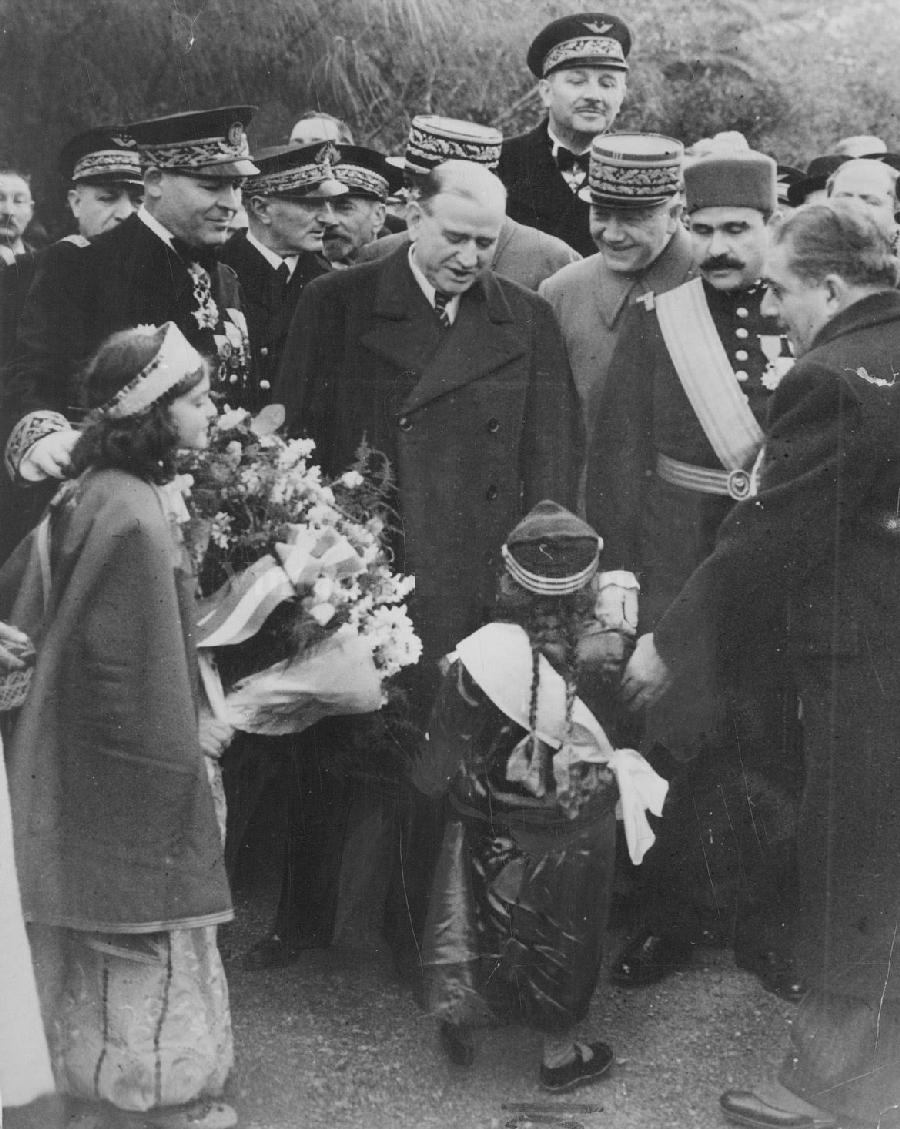
World War II Biographies: Édouard Daladier (France, 1884-1970)

Figure 1.--Prime-Minister Édouard Daladier was a major figure in the French Popular Front governments during the 1930s. Here we see girls presenting him flowers. The photograph is not dated, but was probably taken just before World War II or possibkly during the Phony War (1939-40). After the German break thriugh, Daladier wanted to continue the War from Frenh North Africa, but Pétain had him arrested. What was left of the French officer corps would try to blame their defeat on Daladier, Blum, and other Popular Friont politicans rather than on their failed strategic vision.
|
|
Édouard Daladier was prime-minister of France during a critical point in French history. He was born in Carpentras, France (1884). He studied at Lyons under Edouard Herriot who led the Radicl Party, acctuallu a center-left oparty. . He joined the Radical Party, actually a center-left oparty. He was elected mayor of Carpentras (191) abd then entered the Chamber of Deputies in the same year. He became kniown as the 'Bull of Vaucluse' because of his thick neck. He came to replace Herriot as party leader. His first position in government was minister of the colonies (1924). He held several other government posts, including minister of war. He became oprime-minister twice (1933 and 34), but for brief periods. Adolf Hitler's rise to power caused a shift in the French lft which had been strongly anti-war. Led by Socialist Leon Blum, Maurice Thorez, Edouard Herriot, and Daniel Mayer formed the Popular Front (1934). The Communist Party, the Socialist Party, and Daladier's Radical Party joined the Popular Front. They won the 1936 parlimntary election, gaining 376 seats. .
Blum became prime minister and Daladier Minister of War. The Popular Front enacted a range of social reforms as well as nationlizing the Bank oif France abd the arms industry. It did not change basic Frencch defense policy.
Daladier supported Blum's attempt to provide military aid to the Spanish Government, but British Prime Minister Stanley Baldwin more concened with the Communist threat and thus on a policy of appeasing Hitler as well as foreign minister Anthony Eden convinced him to instead adopt a policy of neutrality. Britain and France were allies, but Frnce was a jinior partner with a nmuch smaller industrial base. France had no chance of confrionting Germany without Britain. Daladier became prime-minister (1938). Along with Chamnberlain he participated in the Munich Conference, but basically ad to follow Chambelain's lead. And Chambrlain like Baldwin was set on appeaement. France had treaty obligations to Czechoslovakia, Britain did not. But without Britain, Daladier did not dare meet its obligation to the Czechs. Thus Daladier reluctabtly agreed to the Munich scciords, sging over the heavily fortified Czech Sudetenland to the NAZIs. He was Minister of Defense when the Germans struck in the West (May 1940). He intended to cintinue resistance from French North Africa, but was arrested by Vichy authiorities. He was among the French oifficals tried for treason by the Vichy Government at the Riom Trial, basically Pétain's effort to vindivate the French Army. The Germans pit a stop to the trial as the defendents were allowed to defend themselves (1942). The Germans took custody of him (1943), but he survived the War.
CIH -- WW II

Navigate the CIH World War II Section:
[Return to Main World War II biography page]
[Return to Main World War II essay page]
[About Us]
[Aftermath]
[Biographies]
[Campaigns]
[Children]
[Countries]
[Deciding factors]
[Diplomacy]
[Geo-political crisis]
[Economics]
[Home front]
[Intelligence]
[Military forces]
[POWs]
[Resistance]
[Race]
[Refugees]
[Technology]
[Totalitarian powers]
[Bibliographies]
[Contributions]
[FAQs]
[Images]
[Links]
[Registration]
[Tools]
[Return to Main World War II page]
[Return to Main war essay page]
[Return to CIH Home page]
Created: 7:22 AM 9/15/2018
Last updated: 7:22 AM 9/15/2018



